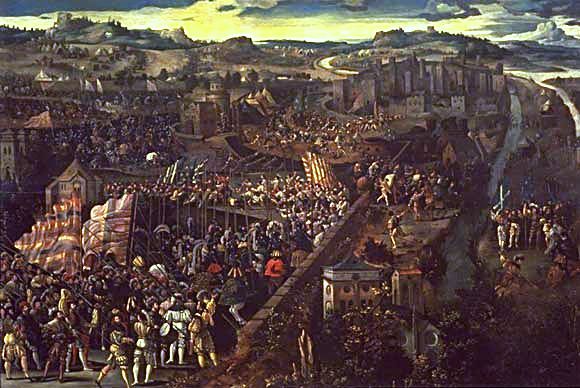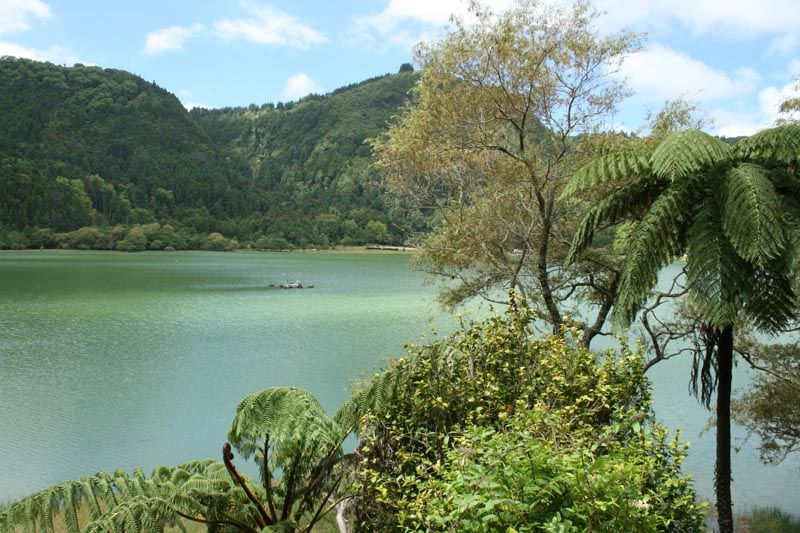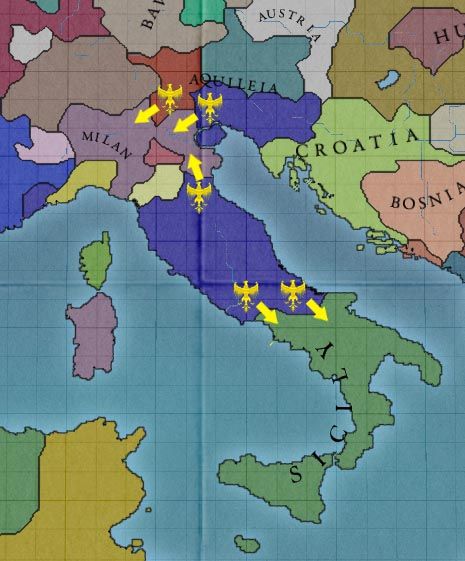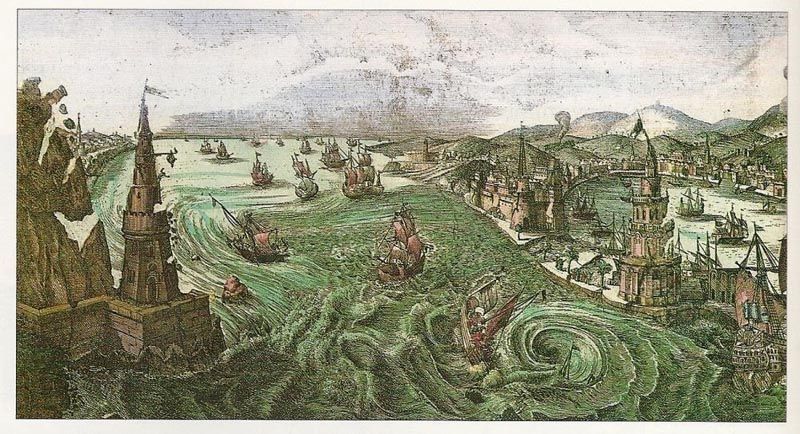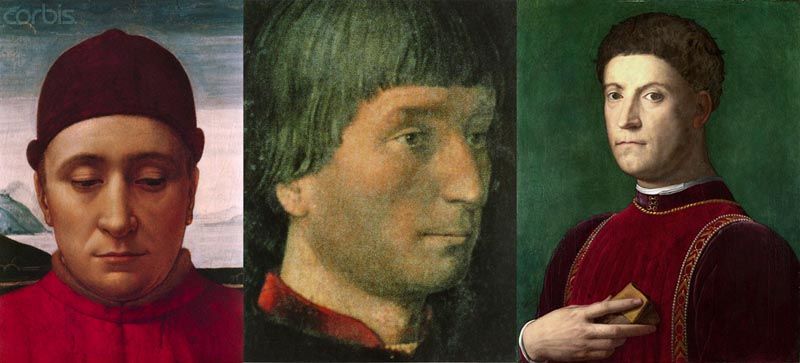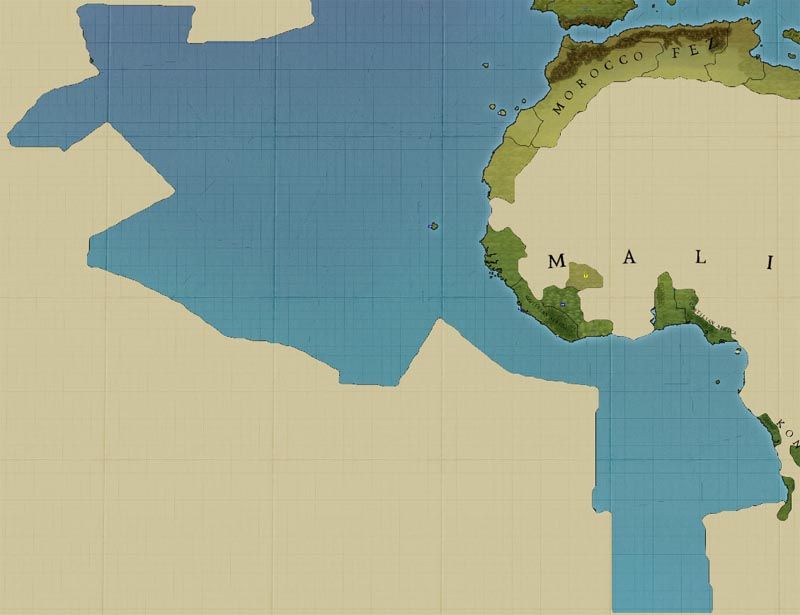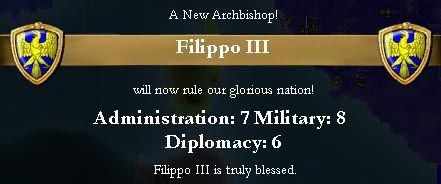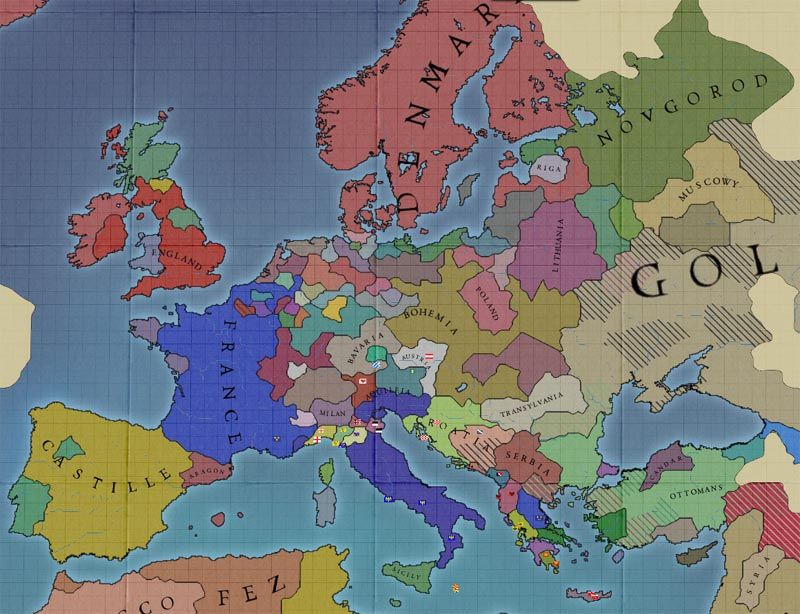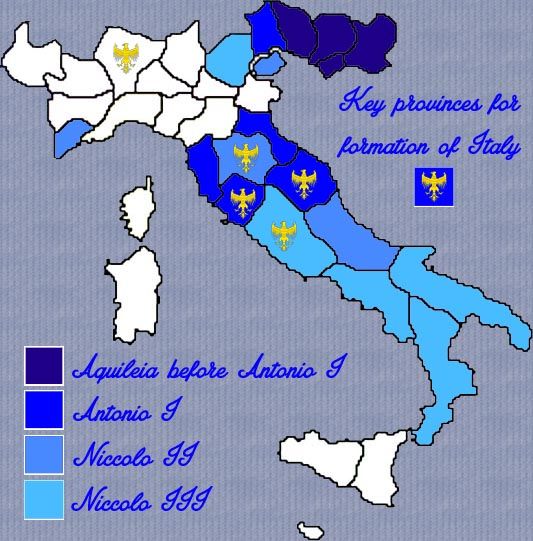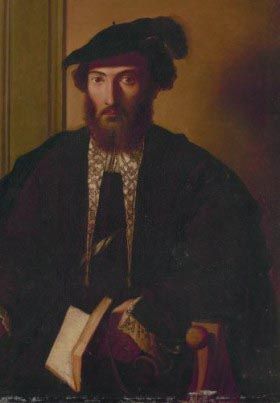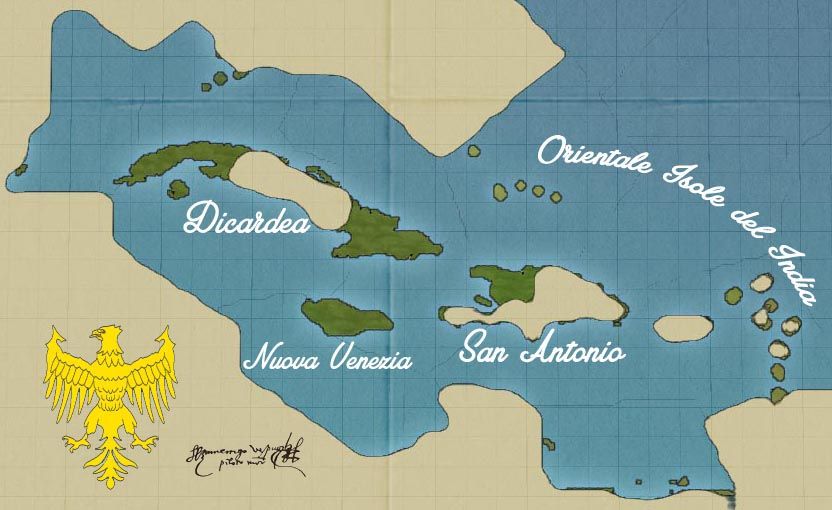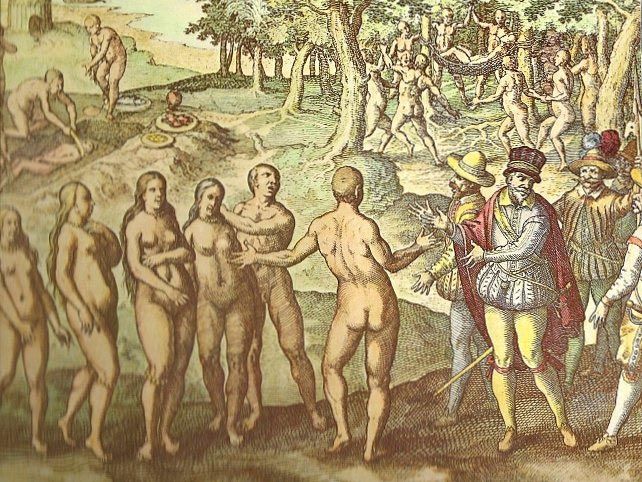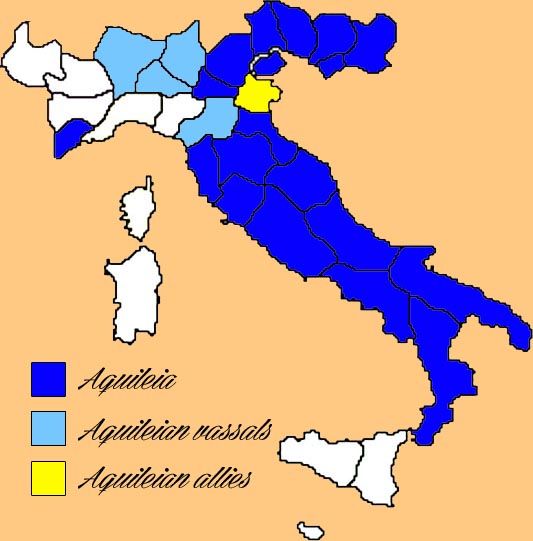2.4. Catholic influence (1452-1464)

One couldn't watch Castillan ship La tierra de Dios docking in port of his own country. The ship and the captain Rodrigo were known as notorious, but not in naval fighting terms, but as messengers of Castillan king. They were known throughout the Europe as the carriers of numerous declarations of war. And when ship entered Adriatic sea fear spread through neighbouring nations like plague did in these years. Niccolo couldn't think straight, he left Palazzo Re Enzo and went to port of Romagna as soon as he heard that Aquileia is their destination. On his short way there he ordered full mobilization and called for emergency council meeting. But Rodrigo didn't take declaration of war with him, he was sent by King Juan de Tastamara to bring important news from Atlantic sea and sealed letter from Leonardo di Carde. Letter was wax sealed with de Carde coat of arms intact and Iberians showed great amount of respect for Aquileia. Niccolo almost had heart attack on this change of situation, was feeling very weak, but still found time to give Castillans several boxes of Aquileian wine, some jewelry and five bottles of alcohol plum spirit.
"Your Grace,
we have met Castillan ship on open sea, and as they are returning to Europe it is a perfect opportunity to send a letter informing you about our adventure. Unfortunately, we haven't reached India yet, in fact we are still in early stage of our exploration, but stay assured, we will find new routes to India.
However, we have charted two new big islands on our map, and it seems that they haven't been explored yet. First one is near coast of Africa and Portuguese, who were on trip to southern Africa named it's shore Madeira, so we are using that name as well. General Containi lead expedition of 200 men onto the island at November, 3rd while we decided to sail northwest and reached another island on December, 19th which we named Azores, where Containi is now, exploring. It is long way from European continent and seems like a perfect place to build naval base were our merchants on way to India can replenish.
In addition to this letter, I'm send map of newly charted islands as well as list of supplies important to set up first colonies of Aquileian people. As you could imagine, two of nobles, Marata and Candreva families have already laid claims on Madeira islands. From my point of view, however, I think we should give best location to general Containi, brave man who dared to explore and then let noble families to choose position. We would like to continue with trip to India in week or so, but I must ask you to send at least 500 soldiers to protect the land and help establishment of colonies.
Your servant, prof Leonardo di Carde
From newly charted islands of Madeira, 18th of January 1452"
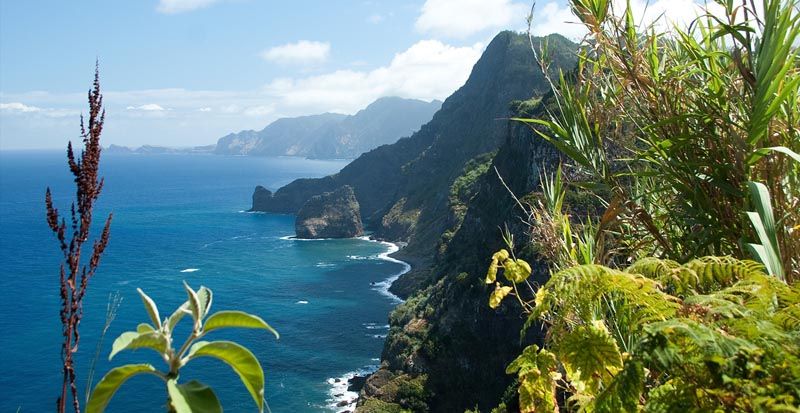

Island of Madeira was first unhabited piece of land found on way to India
During the year of 1452 Aquileian people lived in peace, building up and producing neccessary supplies for settlement of Madeira. That year first carrack was built, Sant Maria de Miraicoli and Tobias Rosenkrantz from Denmark was hired to help in colonization of two newly charted islands. And in November it all started when first 100 settlers reached Madeira and started building infrastructure. Next year Leonardo di Carde returned to Europe after exploring and charting for three years, but he couldn't reach India, no matter how hard he tried.
Archbishop Niccolo II died of old age on October, 15th 1455. It was hard hit for Aquileia and it's population, but his nephew and successor Niccolo III della Torre was intelligent and well educated bishop who had even bigger aspirations to conquer Rome and Pope, backstabber Leo X. As he also inherited letter of Antonio where first Archbishop of modern Aquileia wrote about creation of Italian nation, he promptly acted and after two months declared war on Papal States, together with their allies Savoy, Switzerland, Naxos and England. Six days later, on 18th of December 1455 he even signed Declaration of Statue in Restrain of Appeals.

Niccolo III della Torre was made for big things and he could become even bigger than Antonio or Niccolo II
The Act, drafted by Jacopo Luserna della Torre on behalf of Archbishop Niccolo III della Torre of Aquileia, forbade all appeals to the Pope in Rome on religious or other matters, making the Archbishop the final legal authority in all such matters in Friuli, central Italy, and other Aquileian possessions. This was achieved by claiming that Aquileia was leader of Catholics after Papal States declared war on it's ally in 1449 losing all of credibility. Aquileian expansion saw the nation becomes largest Catholic theocracy in world, a fact that helped in support of act.
War against Pope was quick and brutal as Niccolo III marched through streets of Rome in April, 3rd as conqueror forcing Pope into signing two very important documents that placed Aquileia as true leader of Catholics, acceptation of defeat which saw Papal States become Aquileian vassal state and Act of Confirmation. Act of Confirmation is document that supports Aquileian claims as true leaders of Catholic world, but Pope still stayed as formal leader.
First major battle of war against remaining enemies was in December, when Amedeo IX di Savoia attacked besieging troops of Piedmont, lead by Gaetano Sfondrati. With just 100 casualties defenders killed or captured nearly half of 11000 attacking troops forcing white peace.

Crucial battle in war against Papal States' ally took place in Piedmont
Lodovico de Carde returned to exploration in 1459 and in October he discovered The Canaries, string of islands located south of Madeira. Six months later first settlers reached The Canaries, making it second Aquileian colony. However, Lodovico de Carde got lost on Sant Maria de Miraicoli in Atlantic. Archbishop Niccolo III last heard of him in January, 1461 when de Carde left Azores in his second attempt to reach India by sailing west.
By the end of 1461 new Archbishop, Niccolo III passed Dissolution of Monasteries Act which saw conversion of monasteries to communes that produced important goods for population. And while it was strange for Catholic to do so, Archbishop felt that habitants of monasteries were big spenders who lived in their own world, he felt that they are parazites who robbed poor people and in exchange for denaros promised them better future. He, however, has secularised the nation and while Catholic church was the most important part of nation it needed to be rationalized. On March, 29th 1464 he recieved wonderful news from new islands, The Canaries, which became self-sustaining Aquileian territory leaving only Madeira as colony that needed cold to improve.
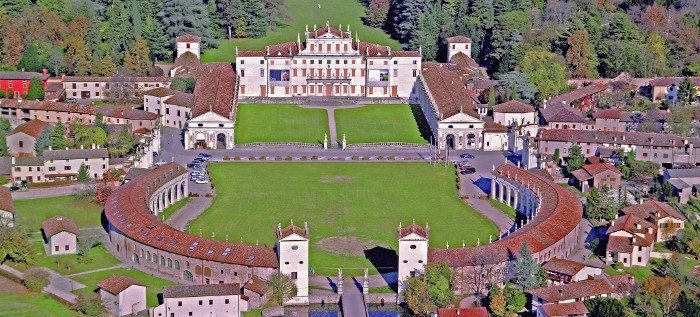
Niccolo III returned permanent Archbishop's residency to Udine, to Palazzo Patriarcale

One couldn't watch Castillan ship La tierra de Dios docking in port of his own country. The ship and the captain Rodrigo were known as notorious, but not in naval fighting terms, but as messengers of Castillan king. They were known throughout the Europe as the carriers of numerous declarations of war. And when ship entered Adriatic sea fear spread through neighbouring nations like plague did in these years. Niccolo couldn't think straight, he left Palazzo Re Enzo and went to port of Romagna as soon as he heard that Aquileia is their destination. On his short way there he ordered full mobilization and called for emergency council meeting. But Rodrigo didn't take declaration of war with him, he was sent by King Juan de Tastamara to bring important news from Atlantic sea and sealed letter from Leonardo di Carde. Letter was wax sealed with de Carde coat of arms intact and Iberians showed great amount of respect for Aquileia. Niccolo almost had heart attack on this change of situation, was feeling very weak, but still found time to give Castillans several boxes of Aquileian wine, some jewelry and five bottles of alcohol plum spirit.
"Your Grace,
we have met Castillan ship on open sea, and as they are returning to Europe it is a perfect opportunity to send a letter informing you about our adventure. Unfortunately, we haven't reached India yet, in fact we are still in early stage of our exploration, but stay assured, we will find new routes to India.
However, we have charted two new big islands on our map, and it seems that they haven't been explored yet. First one is near coast of Africa and Portuguese, who were on trip to southern Africa named it's shore Madeira, so we are using that name as well. General Containi lead expedition of 200 men onto the island at November, 3rd while we decided to sail northwest and reached another island on December, 19th which we named Azores, where Containi is now, exploring. It is long way from European continent and seems like a perfect place to build naval base were our merchants on way to India can replenish.
In addition to this letter, I'm send map of newly charted islands as well as list of supplies important to set up first colonies of Aquileian people. As you could imagine, two of nobles, Marata and Candreva families have already laid claims on Madeira islands. From my point of view, however, I think we should give best location to general Containi, brave man who dared to explore and then let noble families to choose position. We would like to continue with trip to India in week or so, but I must ask you to send at least 500 soldiers to protect the land and help establishment of colonies.
Your servant, prof Leonardo di Carde
From newly charted islands of Madeira, 18th of January 1452"


Island of Madeira was first unhabited piece of land found on way to India
During the year of 1452 Aquileian people lived in peace, building up and producing neccessary supplies for settlement of Madeira. That year first carrack was built, Sant Maria de Miraicoli and Tobias Rosenkrantz from Denmark was hired to help in colonization of two newly charted islands. And in November it all started when first 100 settlers reached Madeira and started building infrastructure. Next year Leonardo di Carde returned to Europe after exploring and charting for three years, but he couldn't reach India, no matter how hard he tried.
Archbishop Niccolo II died of old age on October, 15th 1455. It was hard hit for Aquileia and it's population, but his nephew and successor Niccolo III della Torre was intelligent and well educated bishop who had even bigger aspirations to conquer Rome and Pope, backstabber Leo X. As he also inherited letter of Antonio where first Archbishop of modern Aquileia wrote about creation of Italian nation, he promptly acted and after two months declared war on Papal States, together with their allies Savoy, Switzerland, Naxos and England. Six days later, on 18th of December 1455 he even signed Declaration of Statue in Restrain of Appeals.

Niccolo III della Torre was made for big things and he could become even bigger than Antonio or Niccolo II
The Act, drafted by Jacopo Luserna della Torre on behalf of Archbishop Niccolo III della Torre of Aquileia, forbade all appeals to the Pope in Rome on religious or other matters, making the Archbishop the final legal authority in all such matters in Friuli, central Italy, and other Aquileian possessions. This was achieved by claiming that Aquileia was leader of Catholics after Papal States declared war on it's ally in 1449 losing all of credibility. Aquileian expansion saw the nation becomes largest Catholic theocracy in world, a fact that helped in support of act.
War against Pope was quick and brutal as Niccolo III marched through streets of Rome in April, 3rd as conqueror forcing Pope into signing two very important documents that placed Aquileia as true leader of Catholics, acceptation of defeat which saw Papal States become Aquileian vassal state and Act of Confirmation. Act of Confirmation is document that supports Aquileian claims as true leaders of Catholic world, but Pope still stayed as formal leader.
First major battle of war against remaining enemies was in December, when Amedeo IX di Savoia attacked besieging troops of Piedmont, lead by Gaetano Sfondrati. With just 100 casualties defenders killed or captured nearly half of 11000 attacking troops forcing white peace.

Crucial battle in war against Papal States' ally took place in Piedmont
Lodovico de Carde returned to exploration in 1459 and in October he discovered The Canaries, string of islands located south of Madeira. Six months later first settlers reached The Canaries, making it second Aquileian colony. However, Lodovico de Carde got lost on Sant Maria de Miraicoli in Atlantic. Archbishop Niccolo III last heard of him in January, 1461 when de Carde left Azores in his second attempt to reach India by sailing west.
By the end of 1461 new Archbishop, Niccolo III passed Dissolution of Monasteries Act which saw conversion of monasteries to communes that produced important goods for population. And while it was strange for Catholic to do so, Archbishop felt that habitants of monasteries were big spenders who lived in their own world, he felt that they are parazites who robbed poor people and in exchange for denaros promised them better future. He, however, has secularised the nation and while Catholic church was the most important part of nation it needed to be rationalized. On March, 29th 1464 he recieved wonderful news from new islands, The Canaries, which became self-sustaining Aquileian territory leaving only Madeira as colony that needed cold to improve.

Niccolo III returned permanent Archbishop's residency to Udine, to Palazzo Patriarcale
Last edited:




